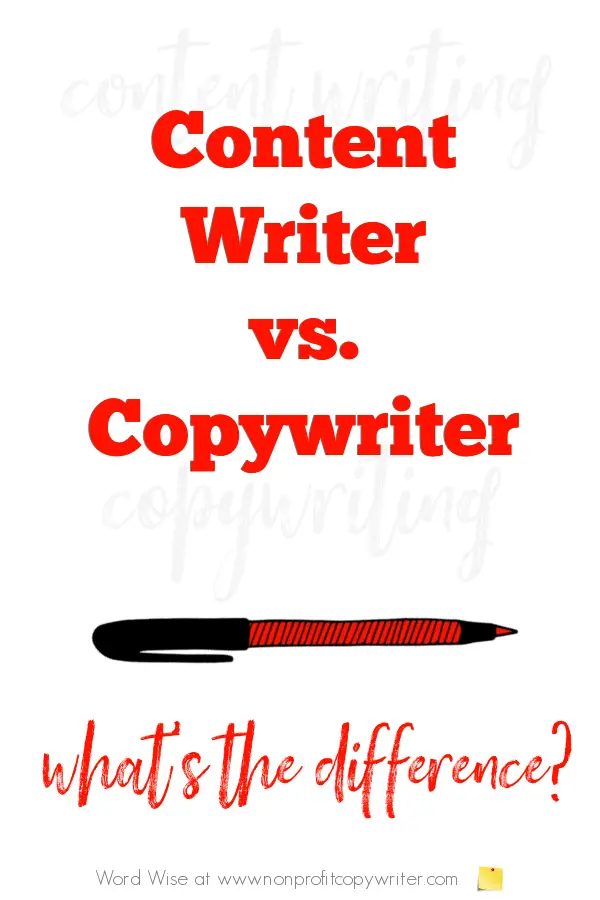Save Time: Get 5 Simple Writing Tips
you can put to use in 10 minutes
Content Writer vs Copywriter: What’s the Difference?
Award-winning writer Kathy Widenhouse has helped hundreds of nonprofits and writers produce successful content , with 750K+ views for her writing tutorials. She is the author of 9 books. See more of Kathy’s content here.
Updated 11.25.25
Content writer vs copywriter: the two terms are often used interchangeably. And to be fair, the two specialties have much in common. Both content writing and copywriting are forms of persuasive writing.
At issue isn’t the persuasive nature that permeates articles, posts, emails, ads, direct mail, eBook, social media, podcasts — nearly all forms of web writing. Both a content writer and a copywriter use writing skills to persuade.
The difference is in the subtle ways content writers and copywriters slant those skills.
Content writer vs copywriter: 4 subtle ways to slant your skills
1. Slant your goal: inform vs sell
A content writer’s goal is to provide information that educates, entertains, or instructs. That means when you write a piece of content, you understand what a reader needs, and you do everything you can to provide it.
Do that, and you build the reader’s trust. As the reader has come to depend on a content provider as a reliable source, she continues to open the provider’s emails or read the provider’s posts or even go to the site to hunt for an answer to a question. A reader recognizes the content provider as an expert. The provider “gets” her.
A copywriter’s goal is more urgent. Your purpose is to convert. That is, to make a sale … to get the click … inspire the reader to give to a cause … move her to volunteer for an event … compel him to get more information … elicit action. Pioneering advertising copywriter John E. Kennedy (1864–1928) defined copywriting as “salesmanship in print.”
You can see why both roles have value in the online writing process. The content writer provides quality information consistently over the long term. Then, the reader is ready to take action when the copywriter makes an offer — and does so based on the goodwill and trust that the content writer has earned.
Write content to inform. Write copy to sell. Persuade with both.
2. Slant your format: long form vs short form
Content writer vs copywriter: each cultivates different formats.
A content writer wants a relationship with the reader.
When you build a relationship, you communicate. You share information. That’s why a content writer is skilled at long-form writing projects like articles, blog posts, newsletters, eBooks, books, features, podcasts, and white papers — projects that inform, educate, or entertain.
A copywriter wants action.
Short-form content works best for that kind of immediate response: ads, sales letters, direct mail, email campaigns, commercials, catalogs, billboards, postcards, and social media. “To win the click or the sale, you must not only answer the reader’s question of ‘why this?’, but also ‘why this now?’” explains Nick Wolny, Director of Content at Super Connector Media. “Copywriters thread urgency and scarcity into a headline to elicit fast action,” he says.
There’s an overlap between long-form content and short-form content. But you can see why a content writer gets plenty of practice with long-form content and a copywriter becomes skilled at short content that persuades a reader to act.
Plan and track your content using this fillable and re-usable Content Calendar Template
3. Slant your SEO skills: drive traffic vs convert traffic
The term “web traffic” refers to the number of visitors who visit a website, blog, or online page. The more traffic a page receives, the more visitors it gets. The more visitors, the more conversions. You want to drive traffic to your online home. Then, you want to convert that traffic into a reader taking an action.
- Content writers drive traffic. They are skilled at using SEO. Content writers choose and place high value keywords in appropriate places in their content to drive inbound traffic.
- Copywriters know a bit about SEO. They may be good at it, too, but it’s not their main focus. Instead, copywriters capitalize on all that luscious inbound traffic. Their job is to use words to get the reader to take an action once they land on a page. Copywriters use keywords and urgency to convert traffic to sales or leads.
4. Slant your strategy: long-term vs short-term
Content writing is about the long game – that is, engaging your target reader repeatedly over time so she comes to trust you and be interested in your product or service. It is part of an effective marketing strategy.
Good content attracts readers, who initially find your content because from an inbound link or referral or web search. These readers engage with the provider. You continue to build credibility with reliable, consistent information. Ultimately, your content equips your readers to engage, to participate, to purchase, to give, to support, to volunteer, to become an advocate, or take another action. Strong content has a long shelf life and adds value to your online home consistently over time.
Want to know if your content works? Your traffic metrics grow over time.
A piece of copy, however, has a short-term goal: get the reader to act immediately. Like good content, you can identify good copy by its metrics. But in the case of copywriting, it’s high numbers of open rates and click-throughs. Copywriters know how to get a short-term uptick by writing with urgency.
Content writer vs copywriter: can you be both?
There’s overlap between content writing and copywriting. But the distinctions are real. “SEO experts and business owners would love to get the best of both worlds (in a single piece) – content that’s made to attract organic traffic and get a high conversion rate,” says SEO copywriter Jessica Foster. “But the reality is that SEO content is best at driving traffic and sales copy is best at selling.”
- Can a content writer become a copywriter? Yes. It’s a question of developing Ask skills that lead to conversions.
- Can a copywriter become a content writer? Yes. You’ll need to juice up your SEO skills and learn how to create long form content like articles, white papers, and eBooks that share high-quality information with readers.
Content writer vs copywriter:: they are two different animals, but they share an important stripe: persuasion. Why not acquire both skills? You can engage readers by writing well-optimized, valuable content – and convert that traffic sooner rather than later with copywriting.
In the end, it’s all about persuasion. And how you slant it.
More Content Writing Tips
How to Create a Content Calendar ...
The Skinny on Thin Content: Don’t Put Rankings Over Readers ...
How to Build a Content Writing Strategy for Your Blog or Website ...
How To Choose Content Topics for Your Content Calendar ...
7 Different Types of Content Writing You Need to Master ...
More Tips for Writing Content on our Pinterest board ...
As an Amazon Associate I earn from qualifying purchases.
Share This Page

Named to 2022 Writer's Digest list
BEST GENRE/NICHE WRITING WEBSITE


Stop Wasting Time!
Grab your exclusive FREE guide, "5 Simple Writing Tips You Can Put to Use in 10 Minutes or Less"













